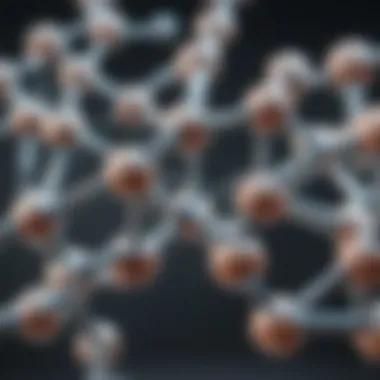Understanding the Role of CCP Autoantibodies in Rheumatology


Intro
Cyclic citrullinated peptide antibodies, commonly referred to as CCP autoantibodies, play a critical role in the field of rheumatology, especially in the context of rheumatoid arthritis (RA). Understanding their significance is essential for both clinical practice and ongoing research. These autoantibodies serve as valuable biomarkers, offering insights into not only the presence of disease but also its progression and potential therapeutic responses. This article seeks to provide a comprehensive overview on CCP autoantibodies, examining their development, clinical implications, and the evolving landscape of research in this area.
Research Background
Overview of the Scientific Problem Addressed
The presence of CCP autoantibodies is a hallmark of rheumatoid arthritis, which is an autoimmune disorder characterized by chronic inflammation of the joints. This condition can lead to debilitating pain, swelling, and eventual joint destruction. Early and accurate diagnosis is crucial for effective treatment and management of RA, and CCP autoantibodies provide a reliable indicator. However, despite their clinical relevance, the interpretation of CCP testing can be complex, raising questions about their specificity, sensitivity, and overall role in disease prognosis.
Historical Context and Previous Studies
The discovery of CCP autoantibodies can be traced back to 2000, when researchers identified their association with RA. Prior to this, autoantibodies such as rheumatoid factor (RF) were used, but they lack the specificity of CCP autoantibodies. Numerous studies have since confirmed the importance of CCP testing in diagnosing RA and differentiating it from other inflammatory arthritides. Notably, early studies found that CCP autoantibodies are present in approximately 70-80% of patients with RA, making them a vital tool for clinicians.
Findings and Discussion
Key Results of the Research
Recent research has expanded our understanding of CCP autoantibodies beyond diagnostics. Studies indicate that these autoantibodies may also correlate with disease severity, prognosis, and treatment outcomes. Patients who test positive for CCP antibodies often experience more aggressive disease progression, necessitating a more proactive approach to management. Furthermore, the presence of these autoantibodies has been linked with joint damage, emphasizing their potential role in guiding therapeutic decisions.
Interpretation of the Findings
The significance of CCP autoantibodies extends into the realm of clinical practice. Their detection can help clinicians tailor treatment strategies to better address individual patient needs. While they are not the sole indicator of the disease, their presence supports a multifaceted diagnostic approach that includes clinical evaluation and imaging.
"The role of CCP autoantibodies is not limited to diagnosis; they are crucial in predicting disease outcomes and therapeutic efficacy."
Nonetheless, the interpretation of CCP tests is not without controversy. Some patients may present with positive CCP without fulfilling all the criteria for RA, leading to debates about the specificity of these markers. Continued research is necessary to refine our understanding of CCP autoantibodies and their implications for future diagnostic frameworks.
Prelims to CCP Autoantibodies
CCP autoantibodies are a crucial topic within rheumatology. They play a significant role in the diagnosis and management of rheumatoid arthritis (RA). Understanding these autoantibodies encompasses several important elements, including their definition, significance, and historical context. By exploring these key points, we can appreciate the implications of CCP autoantibodies in clinical practice and research.
Definition and Significance
Cyclic citrullinated peptide (CCP) antibodies are a type of autoantibody. They react against proteins that contain citrulline, an amino acid formed by the conversion of arginine through a process called citrullination. The presence of these antibodies in a patient’s blood can be an early indicator of rheumatoid arthritis. Studies indicate that they have higher specificity for RA compared to other rheumatoid factors. Their detection is important as it can lead to earlier diagnosis and intervention, which is crucial for preventing long-term joint damage.
The significance of CCP autoantibodies extends beyond just diagnosis. They can provide information about disease activity and prognosis. Patients with a higher titer of CCP antibodies often experience more severe disease outcomes. This correlation makes them not only a marker of the disease but also a potential tool for predicting disease trajectory.
History of Discovery
The discovery of CCP autoantibodies dates back to the 1990s. Researchers sought to better understand autoimmune responses connected to rheumatoid arthritis. In 2000, a group of scientists led by Dr. Jan S. van Venrooij identified cyclic citrullinated peptides as specific targets for antibodies in RA patients. Their work demonstrated how these antibodies could be utilized to create more precise diagnostic tests.
Initially, testing methods involved laborious processes and lacked the specificity needed for effective clinical use. The introduction of sophisticated laboratory techniques improved testing accuracy and usability. As a result, CCP antibody testing became a standard in rheumatology. This evolution marked an important milestone in both diagnostic medicine and understanding autoimmune conditions better.
"CCP autoantibodies serve as both a biomarker for disease and a predictor of severity, underscoring the importance of understanding their role in rheumatology."
In summation, the introduction to CCP autoantibodies offers valuable insights into their critical role within the context of rheumatoid arthritis. From the definition and significance to the historical backdrop, all these aspects emphasize the necessity of recognizing and applying knowledge about CCP autoantibodies in clinical settings.
Biological Mechanisms Behind CCP Autoantibody Production
The production of CCP autoantibodies is a complex process that involves various biological mechanisms. Understanding these mechanisms is essential for grasping the role of these antibodies in rheumatology, particularly in the context of rheumatoid arthritis. The study of this topic helps elucidate why and how these autoantibodies form, and it also provides insights into potential therapeutic interventions.
Role of Citrullination in Autoimmunity


Citrullination is the primary mechanism underlying the formation of CCP autoantibodies. This process involves the conversion of the amino acid arginine into citrulline through the action of peptidylarginine deiminases (PADs). Such conversion alters the protein structure, making them appear foreign to the immune system. This reaction primarily occurs in joint tissues and plays a crucial role in the pathogenesis of rheumatoid arthritis.
The enhanced citrullination of proteins expands the repertoire of autoantigens, allowing the immune system to mistakenly recognize these modified proteins as threats. As a result, autoantibodies against these citrullinated proteins, including cyclic citrullinated peptides, are produced.
This process underscores the importance of examining not just the presence of CCP antibodies, but also the conditions that promote citrullination. Environmental factors, such as smoking and microbial infections, have been shown to contribute to this process, thereby highlighting a multifactorial approach to understanding autoimmune diseases.
Immune Response Activation
The immune response activation associated with CCP autoantibodies is a pivotal aspect of autoimmune pathology. Once CCP antibodies are produced, they become part of a broader immune response. These autoantibodies can form immune complexes with citrullinated antigens. This interaction leads to the activation of various immune cells, including macrophages and T-lymphocytes.
In rheumatoid arthritis, the activated immune cells process these complexes and release pro-inflammatory cytokines. The resulting inflammation exacerbates joint damage and promotes disease progression. Understanding this activation mechanism is essential for developing targeted treatments. For example, therapies aimed at inhibiting specific cytokines, like Tumor Necrosis Factor (TNF), have shown efficacy in managing rheumatoid arthritis.
"Understanding the immune response activation relating to CCP autoantibodies is critical not only for diagnosing but also for tailoring effective treatment strategies."
Clinical Relevance of CCP Autoantibodies
CCP autoantibodies are crucial in rheumatology, especially concerning rheumatoid arthritis. Their ability to serve as biological markers for the disease makes them significant for clinicians. The discussion surrounds how these autoantibodies aid in diagnosis, prognosis, and disease management. In rheumatology, understanding the clinical relevance of CCP autoantibodies is fundamental for improving patient care.
Diagnostic Utility in Rheumatoid Arthritis
CCP autoantibodies are vital in diagnosing rheumatoid arthritis. They appear early in the disease course, often before clinical symptoms become evident. Their specificity for rheumatoid arthritis is notably higher than that of rheumatoid factor. Studies show that the presence of CCP antibodies can indicate a diagnosis with considerable accuracy. As an example, the sensitivity of these antibodies ranges between 60% to 70%, while specificity can exceed 90%. This means that they effectively distinguish rheumatoid arthritis from other types of arthritis.
One reason to prioritize CCP testing is its role in identifying patients who may benefit from early intervention. The early diagnosis is important to prevent long-term joint damage and disability. Clinicians should consider incorporating CCP autoantibody testing into routine evaluations of patients presenting with joint pain or swelling.
Prognostic Value in Disease Progression
CCP autoantibodies also hold prognostic value. Research indicates that high levels of these antibodies correlate with more severe forms of rheumatoid arthritis. Such correlations may suggest a more aggressive disease course and the necessity for more intensive treatment. The presence of CCP autoantibodies helps gauge factors like erosive joint disease and systemic involvement. Consequently, they can guide long-term management decisions.
In practical terms, the detection of high levels of CCP can prompt clinicians to adjust treatment plans accordingly. This may include escalated therapy to mitigate disease progression. Furthermore, regular monitoring of CCP levels can provide clues about treatment effectiveness and disease activity over time. An understanding of these aspects is undeniable in guiding therapeutic strategies.
Correlation with Severity of Disease
The severity of rheumatoid arthritis can be markedly influenced by CCP autoantibodies. Higher titers of these antibodies are often associated with increased joint erosion and damage. This connection is critical because it implications the long-term health of patients. Notably, the presence of CCP is not only a marker for diagnosis but also predictive of the clinical course.
"The extent of damage in patients with rheumatoid arthritis often correlates with the levels of CCP autoantibodies in their blood."
Understanding this relationship aids in refining treatment plans. Therapeutics can be tailored based on the severity indicated by CCP levels. Clinicians must remain vigilant about the implications of CCP results in patient assessments. Such knowledge is essential for implementing proactive strategies.
In summary, CCP autoantibodies play a multifaceted role in clinical practice. Their contributions to diagnosis, prognosis, and disease severity underline their importance in the realm of rheumatology. Clinicians and researchers alike should continue exploring the full potential of these biomarkers to enhance patient outcomes.
Testing for CCP Autoantibodies
Testing for CCP autoantibodies is pivotal in the context of rheumatoid arthritis (RA) diagnosis and management. These autoantibodies arise due to an improper immune response, leading to a breakdown of tolerance against proteins, particularly citrullinated proteins. Detecting these autoantibodies helps clinicians assess the likelihood of RA in patients. The tests also guide therapeutic strategies and monitoring effectiveness over time.
Laboratory Methods and Protocols
Various laboratory methods exist for testing CCP autoantibodies. The most common approach is the enzyme-linked immunosorbent assay (ELISA), which measures the presence and concentration of these antibodies in the serum. This test has undergone many validations to ensure its reliability in clinical settings. Additionally, other testing methods like radioimmunoassay and immunoblotting are utilized, but ELISA remains the gold standard due to its sensitivity and specificity.
Point-of-care tests are emerging, providing quick results with potential for broader access. However, these might not replace conventional laboratory tests entirely. It’s essential that laboratories adhere to rigorous protocols, ensuring that every step, from sample collection to result interpretation, is systematically followed. Proper quality control and continuous training for laboratory personnel contribute to accuracy and trustworthiness of test outcomes.
Interpreting Test Results
Interpreting the results from CCP autoantibody tests involves more than examining numbers alone. A positive result indicates that CCP autoantibodies are present, which significantly increases the probability of RA. Nevertheless, it is crucial to consider clinical symptoms, history, and other laboratory findings in the assessment. False positives can occur due to other conditions, such as infections or other autoimmune diseases.


In contrast, a negative result does not completely rule out RA, especially if clinical symptoms are persistent. Thus, physicians must adopt a comprehensive view when interpreting results. It’s vital that practitioners stay updated on evolving guidelines and research findings, which can impact how test results are factored into patient management strategies.
Studies have shown that approximately 60% to 70% of RA patients are positive for CCP autoantibodies, making it a significant tool in the diagnostic approach.
In addition, ongoing dialogue among rheumatologists about the context and application of these tests continues to refine their interpretation. By coupling robust laboratory methodology with thorough clinical evaluation, practitioners can more effectively utilize CCP autoantibody testing to enhance patient care.
Controversies in CCP Autoantibody Research
Understanding CCP autoantibodies is a complex journey that reveals both their potential and their limitations. The realm of CCP autoantibody research presents various controversies, particularly regarding their diagnostic accuracy and clinical relevance. These debates are not just academic; they have real implications for patients and healthcare providers. Healthy discussion in this area is essential to refine clinical practices and improve patient outcomes.
False Positives and Negatives
One of the most pressing concerns in CCP autoantibody testing is the rate of false positives and negatives. False positives occur when a test indicates the presence of autoantibodies when they are not actually there. This can lead to misdiagnosis, with potentially serious consequences for patient treatment plans. For instance, a false positive result may prompt unnecessary monitoring and treatment, exposing patients to possible side effects of medications without any benefit.
On the other hand, false negatives can be equally harmful. These occur when the tests fail to identify true CCP autoantibodies in a patient who has rheumatoid arthritis. A missed diagnosis leads to delays in treatment, which can result in significant joint damage and lower quality of life for the patient.
In several studies, the prevalence of false results has been noted, suggesting a need for improved screening methods. Researchers are working on refining diagnostic protocols. Better understanding of individual patient factors, such as genetic predispositions and comorbidities, may enhance the accuracy of tests.
Debates on Specificity and Sensitivity
The specificity and sensitivity of CCP autoantibody tests are critical parameters that can shape how these tests are used in clinical settings. Specificity refers to a test's ability to correctly identify those without the disease, while sensitivity measures its ability to identify those with the disease. High specificity and sensitivity are ideal for effective diagnosis.
Many experts debate the optimal cut-off values for these tests. Adjusting these thresholds can significantly impact the rates of specificity and sensitivity. A higher sensitivity might decrease specificity, leading to more false positives, while aiming for higher specificity often reduces sensitivity, increasing false negatives.
Moreover, the lack of standardized testing methods across laboratories contributes to variability in results, which complicates comparisons of outcomes. To address these issues, researchers are examining various biomarkers alongside CCP autoantibodies. This integrated approach may yield a more accurate Identifying process, potentially making the testing protocol more reliable.
A clearer understanding of the limitations and capabilities of CCP autoantibody tests is vital for both researchers and clinicians aiming to enhance diagnostic approaches.
CCP Autoantibodies Beyond Rheumatoid Arthritis
CCP autoantibodies are often associated distinctly with rheumatoid arthritis; however, their significance extends beyond this one condition. Understanding the implications of CCP autoantibodies across different diseases can lead to better diagnostic strategies and treatment options. This section highlights the broader relevance of CCP autoantibodies in the realm of autoimmune disorders and their potential as biomarkers.
Association with Other Autoimmune Disorders
Recent studies indicate a connection between CCP autoantibodies and various autoimmune diseases other than rheumatoid arthritis. For example, there are observed correlations with conditions like systemic lupus erythematosus and Sjögren’s syndrome. The presence of these autoantibodies may suggest a shared pathogenic mechanism among different disorders.
Investigating these associations can be beneficial in several ways:
- Expanded Diagnostic Utility: Doctors may be able to identify certain autoimmune disorders more accurately by checking for CCP autoantibodies. This can enhance early detection.
- Informed Treatment Decisions: Understanding these relationships allows medical professionals to tailor treatments that target the specific underlying processes of the disorder.
- Risk Assessment: Patients with certain autoimmune diseases may benefit from CCP testing to assess their risk for developing rheumatoid arthritis in the future.
Nevertheless, more research is needed to fully clarify these associations. The complexity of autoimmune conditions requires careful interpretation of CCP autoantibody presence and its clinical implications.
Potential as a Biomarker for Other Conditions
CCP autoantibodies could serve as valuable biomarkers for conditions beyond rheumatological diseases. Their stability and specificity make them attractive candidates for research into other inflammatory states or even non-autoimmune diseases. Some potential areas of exploration include:
- Cardiovascular Diseases: There is emerging evidence suggesting a possible link between CCP autoantibodies and cardiovascular problems. The mechanisms may involve inflammation that affects heart health.
- Metabolic Disorders: Research into the role of CCP autoantibodies in metabolic diseases is currently in early stages, but could reveal interesting connections that warrant further investigation.
- Cancer Research: Some studies have suggested that autoantibodies may play a role in tumor immunology, potentially highlighting a nuanced interplay worth exploring more.
The investigation of CCP autoantibodies as biomarkers in other contexts requires rigorous clinical studies. As our understanding evolves, the potential utility of these autoantibodies may expand significantly.
Current Treatment Paradigms in the Context of CCP Autoantibodies
CCP autoantibodies play a crucial role in shaping treatment strategies for patients diagnosed with rheumatoid arthritis. The presence of these antibodies influences not only the diagnosis itself but also the management approaches adopted by healthcare professionals. This section examines how CCP autoantibodies affect treatment choices and identifies emerging therapeutic avenues that are beginning to gain traction in the field.


Impact on Treatment Choices
The detection of CCP autoantibodies has substantial implications for treatment strategies. Their presence typically indicates a higher likelihood of developing aggressive forms of rheumatoid arthritis. As a result, early identification allows for timely intervention, which is pivotal for improving patient outcomes.
Identifying CCP positivity often leads clinicians to adopt more aggressive treatment regimens earlier in the disease course. This proactive approach can include:
- Methotrexate: A cornerstone in the treatment of rheumatoid arthritis, often initiated when CCP autoantibodies are present.
- Biologic DMARDs: Drugs like Adalimumab or Etanercept are frequently used in patients with a high CCP autoantibody status, aiming to quell inflammation aggressively.
- Targeted Synthetic DMARDs: Medications such as Tofacitinib are also considered, as results suggest they could be more effective in CCP-positive individuals.
In contrast, patients negative for CCP autoantibodies might be managed with more conservative strategies, as their disease may have a different trajectory.
Emerging Therapeutic Targets
The landscape of treatment for rheumatoid arthritis is ever-evolving, with research pointing to novel therapeutic targets associated with CCP autoantibodies. A deeper understanding of these autoantibodies has led to various exciting prospective avenues:
- JAK Inhibitors: These agents are receiving considerable attention for their potential to target specific pathways involved in autoimmunity, particularly in patients with high CCP autoantibody levels.
- B-cell Targeting Therapies: Treatments that specifically target B-cells may prove beneficial since B-cells are involved in the production of antibodies, including CCP autoantibodies. Agents like Rituximab may be considered in more severe cases.
- Novel Biomarkers: Research is ongoing to identify additional biomarkers that could work alongside CCP autoantibodies to refine treatment plans further. The integration of these biomarkers into clinical practice may enhance personalized treatment approaches.
"The continued investigation into CCP autoantibodies consolidates their importance in tailoring treatment strategies and optimizing patient care in rheumatology."
Future Research Directions
The landscape of research regarding CCP autoantibodies is continuously evolving. Future research directions are crucial for enhancing our understanding of these biomarkers. They hold the potential to impact not only the diagnosis of rheumatoid arthritis but also the management of the condition.
Emerging technologies and methodologies offer a pathway to refine our assessment of autoantibodies. Innovative approaches could foster advancements in how these biomarkers are detected and quantified. This improvement has the potential to increase the predictive accuracy for disease onset and progression.
Moreover, clinical studies that focus on CCP autoantibody levels in diverse patient populations are equally important. Understanding the variations across demographics can lead to more personalized treatment strategies. There is also potential for integrating CCP autoantibody data with genetic and environmental factors to provide a holistic view of disease predisposition.
"Advancing research in CCP autoantibodies is not merely a scientific endeavor; it is essential for improving patient outcomes in rheumatology."
In summary, the future research directions in CCP autoantibodies encompass several dimensions, including technological advances, demographic studies, and integrative approaches. These elements will not only enhance diagnostic accuracy but could also lead to innovative treatment options for patients.
Innovative Approaches to Autoantibody Assessment
Innovative approaches to autoantibody assessment are vital in promoting more precise and rapid testing methods. Current diagnostic methods may benefit from integrating newer technologies, like high-throughput screening systems and machine learning algorithms. These advancements can allow for a comprehensive evaluation of autoimmune profiles in patients, leading to quicker and more accurate results.
Utilizing platforms like microarray technology could enable simultaneous assessment of multiple biomarkers associated with rheumatoid arthritis. This could improve diagnostic efficiency and offer deeper insights into autoantibody profiles.
Additionally, point-of-care testing may revolutionize how and when assessments are conducted. These testing methods could provide immediate results, facilitating timely treatment decisions. Such an approach can greatly benefit patients, particularly those in remote areas with limited access to specialized care.
Longitudinal Studies on CCP Autoantibodies
Longitudinal studies on CCP autoantibodies are essential in understanding the dynamic nature of these biomarkers over time. Observing how CCP autoantibody levels fluctuate with disease progression can offer valuable insights into temperamental changes within autoimmune conditions.
Tracking patients over extended periods allows researchers to identify patterns correlated with clinical manifestations. This, in turn, can aid in predicting flares or remission phases, providing clinicians with critical information for managing treatment plans efficiently.
Furthermore, these studies can uncover correlations between CCP autoantibody levels and treatment responses. By evaluating the effectiveness of various therapies in relation to autoantibody dynamics, future strategies can be tailored for individual patients, optimizing treatment outcomes.
End
The conclusion of an article plays a vital role in synthesizing the information presented throughout. In this case, it encapsulates the complex relationship between CCP autoantibodies and rheumatology, particularly focusing on their significance in diagnosing and managing rheumatoid arthritis. By summarizing key insights and emphasizing the implications of the research discussed, the conclusion highlights the essential contributions that CCP autoantibodies have made to the field.
Summary of Key Insights
In this article, we explored several critical areas concerning CCP autoantibodies:
- Understanding the Biological Mechanisms: We analyzed how citrullination contributes to the production of CCP autoantibodies and its role in autoimmunity.
- Clinical Applications: The diagnostic utility of these autoantibodies in identifying rheumatoid arthritis was discussed. Their prognostic value reinforces their importance in monitoring disease progression.
- Controversies and Challenges: The debates surrounding false positives and the specificity of the tests are crucial for interpreting results accurately.
- Emerging Research Directions: We touched upon innovative approaches in studying CCP autoantibodies and the promise they hold for future treatment strategies.
"CCP autoantibodies are not just biomarkers; they represent a window into the complexities of autoimmune diseases."
Overall, understanding CCP autoantibodies can enhance diagnostic accuracy and treatment outcomes for patients with rheumatoid arthritis. As research evolves, continuous examination of these biomarkers will be essential for developing more effective management strategies. The ongoing exploration in this field encourages both clinicians and researchers to stay abreast of new findings, ensuring that patients receive the most informed care possible.







